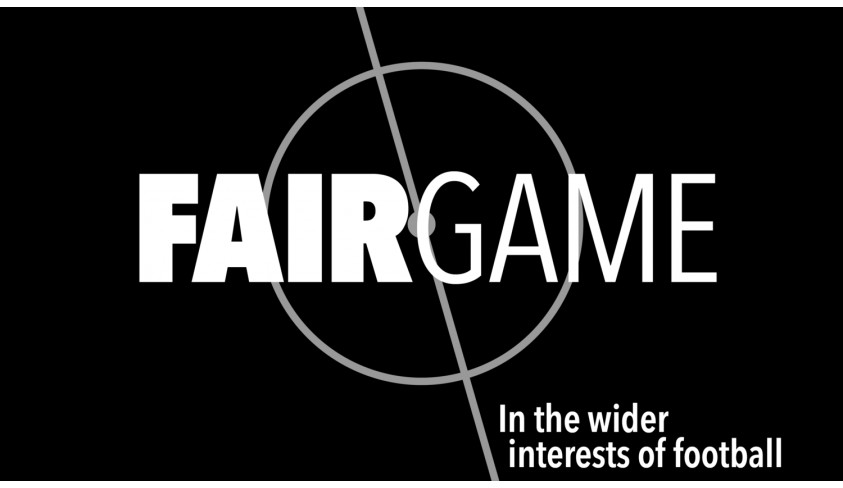Hard hitting report
NEW REPORT LINKS FOOTBALL’S FAILING FINANCES TO GENDER INEQUALITY
- Football board membership in ‘dark ages’ when compared to other industries
- Only 11.1% of board members at Premier League clubs and 26% of spectators are women
- Deep-rooted prejudice revealed in the men’s game
- Large potential female fanbase being routinely excluded
FAIR Game – a group of 34 value-driven football clubs – has today launched a new hard-hitting report on the impact of gender inequality on football in England and Wales.
The 22-page report, The Gender Divide That Fails Football's Bottom Line: The Commercial Case for Gender Equality, is the result of months of hard work from leading academics in the UK and was the centrepiece of Fair Game’s all-day International Women’s Day Conference.
The report uncovered severe under representation of women throughout the game, and a lack of facilities and provisions for women – which has led to a massive loss in potential revenue at all levels of the game.
Gender diversity in the boardroom has been shown to improve financial performance in sport and across other industries. Despite this, only 11.1% of board members at Premier League clubs are women, compared to 39.1% across FTSE 100 companies. And two thirds of England and Wales’ leading clubs have all-male boards.
The report comes at a time where many football clubs are standing on a financial precipice of spiralling expenditure and financial unsustainability. Indeed, Fair Game’s findings last week revealed that 52% of football’s top clubs are technically insolvent.
Yet, tackling gender discrimination has substantial potential to increase the numbers of women fans at football matches, filling stadia and increasing club revenues.
There are significantly less women sports fans attending football in the UK compared to other countries and those that do attend have a significant chance of experiencing sexism.
Only 26% of spectators at Premier League games are women. And a Scottish football survey revealed 25% of female fans have experienced sexist comments while at a match. Yet, Stadia outside the Premier League rarely reach capacity.
Their spending power is also being ignored. In the US, 47% of spectators at NFL matches are female, and yet 80% of all sports clothing purchases in the US are from women.
This report makes three key recommendations:
- Clubs to make their stadia and matchday environments inclusive with child-friendly spaces
- A mechanism for women to report incidents of sexism and misogyny in football and be taken seriously
- Consequences for perpetrators
Christina Philippou, Principal Lecturer at the University of Portsmouth and Fair Game’s Director of Policy, was one of the editors of the report. She said: “The lack of gender equality within football does need to be addressed. Fair Game clubs recognise the need for change.
“Financial sustainability depends on good decision-making and engaging with communities. This report addresses the commercial opportunities gender equality can bring to both men's and women’s football."
Dr Stacey Pope, co-author of the report and an Associate Professor at Durham University, added: "We looked at all aspects of how football operates at the moment and in a large number of cases clubs are living in the dark ages and are failing to cater adequately for 51% of the population.
“This is at a time when public attitudes towards sexism and misogyny are changing, and football needs to change too. Clubs need to create an environment that is safe, welcoming and inclusive for all women.
“Economically, the current situation in football is also hugely naive. Such an outdated stance makes reaching the Holy Grail of financial sustainability even more difficult to achieve and is even more reason for change."
The report also looked at women’s football, which has seen huge revenue, broadcasting and fan growth in recent years. The report concluded that this ‘new age’ of women’s football presents football leagues and clubs with an opportunity to diversify revenue streams and capitalise on largely untapped women’s football broadcasting and sponsorship opportunities.
Accelerating the growth of women’s football requires investment in grassroots, academies, coaching and infrastructure to encourage participation and talent development from a young age. The increased competitiveness of the domestic leagues and national team would see the commercial value of women’s football continue to increase.
Beth Clarkson, a Senior Lecturer at the University of Portsmouth, who helped launch the report today, said: “The competitiveness, viewership and marketability of women’s football is on an upward trajectory. Strategic investment attuned to the needs of the women’s game would be meaningful for the players and create value for fans, sponsors, investors, broadcasters and other stakeholders.”














